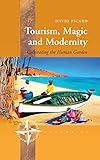Tourism, Magic and Modernity : Cultivating the Human Garden / David Picard.
Material type: TextSeries: New Directions in Anthropology ; 32Publisher: New York ; Oxford : Berghahn Books, [2011]Copyright date: ©2011Description: 1 online resource (206 p.)Content type:
TextSeries: New Directions in Anthropology ; 32Publisher: New York ; Oxford : Berghahn Books, [2011]Copyright date: ©2011Description: 1 online resource (206 p.)Content type: - 9780857452016
- 9780857452023
- 306.4/819 22/eng/20230216
- online - DeGruyter
| Item type | Current library | Call number | URL | Status | Notes | Barcode | |
|---|---|---|---|---|---|---|---|
 eBook
eBook
|
Biblioteca "Angelicum" Pont. Univ. S.Tommaso d'Aquino Nuvola online | online - DeGruyter (Browse shelf(Opens below)) | Online access | Not for loan (Accesso limitato) | Accesso per gli utenti autorizzati / Access for authorized users | (dgr)9780857452023 |
Frontmatter -- Contents -- Foreword -- Preface -- Introduction. Penguins in the Paris Underground -- Part I. Aesthetic Transfigurations -- Chapter 1. Tourism and Magic -- Chapter 2. Creole Beautiful -- Chapter 3. Cultivating Society as a Human Garden -- Part II. The Hospitality of the Garden -- Chapter 4. Hospitality and Love -- Chapter 5. Bougainvilleas at the Riverside -- Chapter 6. Poachers in the Coral Garden -- Part III. Cultivating the Human Garden -- Chapter 7. History as an Aesthetics of Everyday Life -- Chapter 8. Towards a Global Gardening State -- Endnotes -- Bibliography -- Index
restricted access online access with authorization star
http://purl.org/coar/access_right/c_16ec
Drawing from extended fieldwork in La Réunion, in the Indian Ocean, the author suggests an innovative re-reading of different concepts of magic that emerge in the global cultural economics of tourism. Following the making and unmaking of the tropical island tourism destination of La Réunion, he demonstrates how destinations are transformed into magical pleasure gardens in which human life is cultivated for tourist consumption. Like a gardener would cultivate flowers, local development policy, nature conservation, and museum initiatives dramatise local social life so as to evoke modernist paradigms of time, beauty and nature. Islanders who live in this 'human garden' are thus placed in the ambivalent role of 'human flowers', embodying ideas of authenticity and biblical innocence, but also of history and social life in perpetual creolisation.
Mode of access: Internet via World Wide Web.
In English.
Description based on online resource; title from PDF title page (publisher's Web site, viewed 25. Jun 2024)


